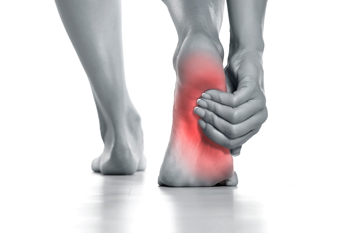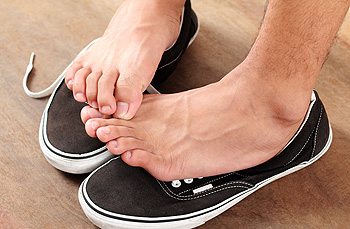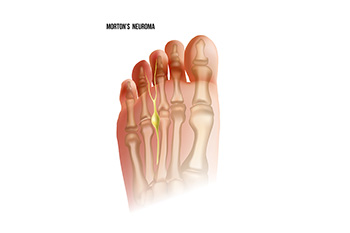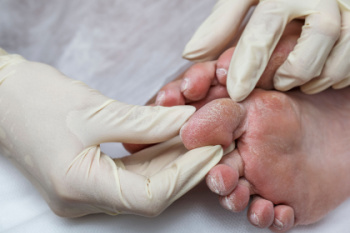Items filtered by date: October 2024
What Causes Foot Pain?

Foot pain can stem from a variety of causes, affecting daily activities and overall quality of life. Diseases such as arthritis and diabetes can lead to inflammation and nerve damage, resulting in chronic discomfort. Deformities like bunions or hammertoes change the structure of the foot, often causing pain during movement. Biomechanical conditions, including flat feet or high arches, can disrupt weight distribution and lead to strain on the muscles and ligaments. Additionally, wearing improper footwear is a significant contributor to foot pain, and shoes that lack support or fit poorly can worsen existing issues. Injuries from sports, falls, or accidents can also cause acute pain, impacting mobility. Any type of foot pain can cause difficulty in completing daily activities. If you have developed foot pain, it is suggested that you contact a podiatrist who can provide an accurate diagnosis and treatment.
Foot Pain
Foot pain can be extremely painful and debilitating. If you have a foot pain, consult with Dr. John Branwell from Kearny, New Jersey. Our doctor will assess your condition and provide you with quality foot and ankle treatment.
Causes
Foot pain is a very broad condition that could be caused by one or more ailments. The most common include:
- Bunions
- Hammertoes
- Plantar Fasciitis
- Bone Spurs
- Corns
- Tarsal Tunnel Syndrome
- Ingrown Toenails
- Arthritis (such as Gout, Rheumatoid, and Osteoarthritis)
- Flat Feet
- Injury (from stress fractures, broken toe, foot, ankle, Achilles tendon ruptures, and sprains)
- And more
Diagnosis
To figure out the cause of foot pain, podiatrists utilize several different methods. This can range from simple visual inspections and sensation tests to X-rays and MRI scans. Prior medical history, family medical history, and any recent physical traumatic events will all be taken into consideration for a proper diagnosis.
Treatment
Treatment depends upon the cause of the foot pain. Whether it is resting, staying off the foot, or having surgery; podiatrists have a number of treatment options available for foot pain.
If you have any questions, please feel free to contact our office located in Kearny, NJ . We offer the newest diagnostic and treatment technologies for all your foot care needs.
Itchy Feet May Be a Cause for Concern

Itchy feet can be bothersome, but may also indicate an underlying issue that needs medical attention. The causes of itchy feet include fungal or bacterial infections, contact with allergens, or dry skin. In some cases, persistent itchiness can be linked to systemic conditions, like diabetes, thyroid problems, or kidney disease. If you experience itching along with other symptoms, like blisters, scaling, or redness, it may be time to seek professional help. A podiatrist can conduct a thorough exam to diagnose the root cause of the itchiness and develop a plan to bring relief and prevent complications. Quick action helps reduce the risk of further irritation or potential infections. It is suggested to avoid scratching, as it can worsen the symptoms and potentially lead to skin damage. If you have uncommonly itchy feet, it is suggested that you schedule an appointment with a podiatrist for an exam and treatment.
Everyday foot care is very important to prevent infection and other foot ailments. If you need your feet checked, contact Dr. John Branwell from Kearny, New Jersey. Our doctor can provide the care you need to keep you pain-free and on your feet.
Everyday Foot Care
Often, people take care of their bodies, face and hair more so than they do for their feet. But the feet are a very important aspect of our bodies, and one that we should pay more attention to. Without our feet, we would not be able to perform most daily tasks.
It is best to check your feet regularly to make sure there are no new bruises or cuts that you may not have noticed before. For dry feet, moisturizer can easily be a remedy and can be applied as often as necessary to the affected areas. Wearing shoes that fit well can also help you maintain good foot health, as well as making it easier to walk and do daily activities without the stress or pain of ill-fitting shoes, high heels, or even flip flops. Wearing clean socks with closed shoes is important to ensure that sweat and bacteria do not accumulate within the shoe. Clean socks help to prevent Athlete’s foot, fungi problems, bad odors, and can absorb sweat.
If you have any questions please feel free to contact our office located in Kearny, NJ . We offer the newest diagnostic and treatment technologies for all your foot and ankle needs.
Recovering from Morton's Neuroma Surgery

Recovery from Morton's neuroma surgery typically involves a gradual process that emphasizes rest and rehabilitation. Initially, patients may need to keep weight off the foot for a few days to reduce swelling and discomfort. By the end of the first week, many can begin gentle range-of-motion exercises to promote flexibility. After two to four weeks, most individuals can gradually reintroduce weight-bearing activities, but high-impact exercises should be avoided until cleared by a podiatrist. Strengthening exercises can be incorporated around the four to six-week mark, focusing on improving stability and muscle support. Wearing appropriate footwear is critical during recovery to ensure comfort and prevent further irritation. If you have Morton's neuroma, it is strongly suggested that you consult a podiatrist who can determine if this type of foot surgery is right for you.
Morton’s neuroma is a very uncomfortable condition to live with. If you think you have Morton’s neuroma, contact Dr. John Branwell of Kearny, New Jersey. Our doctor will attend to all of your foot care needs and answer any of your related questions.
Morton’s Neuroma
Morton's neuroma is a painful foot condition that commonly affects the areas between the second and third or third and fourth toe, although other areas of the foot are also susceptible. Morton’s neuroma is caused by an inflamed nerve in the foot that is being squeezed and aggravated by surrounding bones.
What Increases the Chances of Having Morton’s Neuroma?
- Ill-fitting high heels or shoes that add pressure to the toe or foot
- Jogging, running or any sport that involves constant impact to the foot
- Flat feet, bunions, and any other foot deformities
Morton’s neuroma is a very treatable condition. Orthotics and shoe inserts can often be used to alleviate the pain on the forefront of the feet. In more severe cases, corticosteroids can also be prescribed. In order to figure out the best treatment for your neuroma, it’s recommended to seek the care of a podiatrist who can diagnose your condition and provide different treatment options.
If you have any questions, please feel free to contact our office located in Kearny, NJ . We offer the newest diagnostic and treatment technologies for all your foot care needs.
Plantar Warts Can Be Treated!
Debridement of Diabetic Foot Wounds

Debridement of diabetic wounds is a critical procedure in wound care management, particularly for patients with diabetic foot ulcers. Diabetic wounds often heal slowly due to poor circulation and high blood sugar levels, leading to the buildup of dead or infected tissue that can hinder the healing process. Debridement involves the removal of this dead tissue, allowing healthy tissue to grow and promoting faster healing. This procedure reduces the risk of infection by eliminating bacterial growth in the wound, which can otherwise lead to more severe complications, including amputation. Debridement also improves the effectiveness of other treatments, such as dressings and medications, by creating a cleaner environment for wound healing. If you have diabetic foot wounds, it is strongly suggested that you visit a podiatrist to see if regular debridement sessions, in addition to proper diabetes management, can help prevent serious complications related to your condition.
Wound care is an important part in dealing with diabetes. If you have diabetes and a foot wound or would like more information about wound care for diabetics, consult with Dr. John Branwell from Kearny, New Jersey. Our doctor will assess your condition and provide you with quality foot and ankle treatment.
What Is Wound Care?
Wound care is the practice of taking proper care of a wound. This can range from the smallest to the largest of wounds. While everyone can benefit from proper wound care, it is much more important for diabetics. Diabetics often suffer from poor blood circulation which causes wounds to heal much slower than they would in a non-diabetic.
What Is the Importance of Wound Care?
While it may not seem apparent with small ulcers on the foot, for diabetics, any size ulcer can become infected. Diabetics often also suffer from neuropathy, or nerve loss. This means they might not even feel when they have an ulcer on their foot. If the wound becomes severely infected, amputation may be necessary. Therefore, it is of the upmost importance to properly care for any and all foot wounds.
How to Care for Wounds
The best way to care for foot wounds is to prevent them. For diabetics, this means daily inspections of the feet for any signs of abnormalities or ulcers. It is also recommended to see a podiatrist several times a year for a foot inspection. If you do have an ulcer, run the wound under water to clear dirt from the wound; then apply antibiotic ointment to the wound and cover with a bandage. Bandages should be changed daily and keeping pressure off the wound is smart. It is advised to see a podiatrist, who can keep an eye on it.
If you have any questions, please feel free to contact our office located in Kearny, NJ . We offer the newest diagnostic and treatment technologies for all your foot care needs.
Intrinsic Foot Strengthening Exercises

Intrinsic foot strengthening exercises can play a vital role in alleviating foot and ankle pain, particularly in cases of flat feet. These exercises focus on the small muscles within the foot that support the arch and improve overall stability. One simple yet effective exercise is toe curls, where you use your toes to scrunch a towel or pick up small objects. Another is arch lifts, which involve lifting the arch of the foot while keeping the heel and toes on the ground. A third helpful exercise is the short foot exercise, which strengthens the muscles by attempting to shorten the foot while keeping the toes and heel planted. Regularly performing these exercises can enhance foot strength and support the arch. If you have a foot or ankle condition that causes pain, it is suggested that you consult a podiatrist.
Exercising your feet regularly with the proper foot wear is a great way to prevent injuries and build strength. If you have any concerns about your feet, contact Dr. John Branwell from Kearny, New Jersey. Our doctor can provide the care you need to keep you pain-free and on your feet.
Exercise for Your Feet
Exercise for your feet can help you gain strength, mobility and flexibility in your feet. They say that strengthening your feet can be just as rewarding as strengthening another part of the body. Your feet are very important, and we often forget about them in our daily tasks. But it is because of our feet that are we able to get going and do what we need to. For those of us fortunate enough to not have any foot problems, it is an important gesture to take care of them to ensure good health in the long run.
Some foot health exercises can include ankle pumps, tip-toeing, toe rises, lifting off the floor doing reps and sets, and flexing the toes. It is best to speak with Our doctor to determine an appropriate regimen for your needs. Everyone’s needs and bodies are different, and the activities required to maintain strength in the feet vary from individual to individual.
Once you get into a routine of doing regular exercise, you may notice a difference in your feet and how strong they may become.
If you have any questions please feel free to contact our office located in Kearny, NJ . We offer the newest diagnostic and treatment technologies for all your foot and ankle needs.

